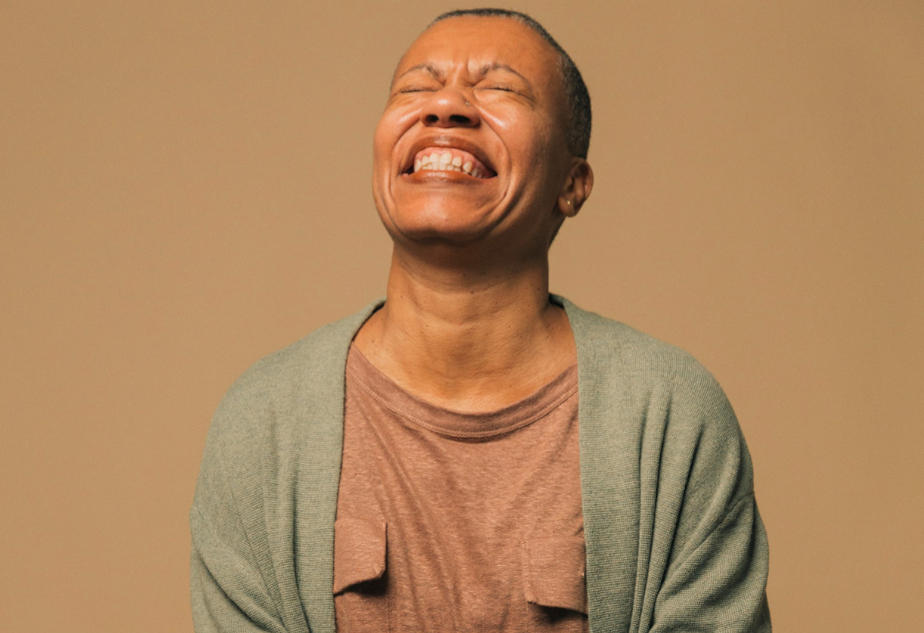The luxury of saying 'No.'

No. The word is an exclamation. It’s a noun. It’s a complete sentence.
It's also a luxury, according to poet Anastacia-Reneé Tolbert.
"I think people of color and women have been conditioned to say ‘yes’ all the time," Tolbert says. "Even if we don’t want to, and even without our consent."
Bill Radke discussed with the Seattle Civic Poet why she wants you to say "no" more often.
The Workshop of Glamorous Refusal
No. The word is an explanation. A complete sentence. And a luxury, says Seattle Civic Poet Anastacia-Renee Tolbert. As her tenure as Civic Poet winds down, Tolbert joined Bill Radke to reflect on what she’s learned from “no,” and the luxurious spaces it’s opened for a “yes.”
Interview highlights have been edited for clarity.
How is saying 'no' different for women and people of color?
From my own personal experience as a woman of color, I’ve been conditioned to say ‘yes,’ as in:
‘Yes, you should do that.’
‘Yes, you better do that.’
‘Yes, if you don’t do it, something bad could happen.’
Sponsored
‘Yes, because if you don’t do it, maybe you won’t get another opportunity, even if you don’t feel well.’
‘Yes, because you have been taught to push through, push on, keep going.’
Say ‘yes,’ say ‘yes,’ say ‘yes.’
If you don’t say ‘yes,’ something bad or negative could happen.
I think if you are in a place where you don’t need anything, to be able to say ‘no’ feels quite luxurious. It’s a privilege to be able to say:
Sponsored
No, I don’t want to do that.
‘No, I don’t think that’s healthy for my well-being.’
‘No, I don’t think that will help my community.’
‘No, I don’t think that’s good for my body.’
‘No, I don’t think that’s great for my mind.’
Sponsored
How have you learned to say ‘no’?
I’m still learning! I thought that once I reached a certain age, I would be ready to say ‘no,’ but actually, I still wonder if me saying 'no' in a certain way will lead to being perceived as negative or aggressive.
In the past couple of years, for example, I’ve decided that if it’s not an organization I’m familiar with, or not one that has reached to me before ... I will not read during Black History Month, because I don’t want to be tokenized.
So I think for me, deciding to say ‘no’ could negatively impact me, but it’s felt great to say ‘no,’ and to ask people to follow up with me in May, June, or July.
'No,' a poem by Anastacia-Renee Tolbert from the book (v.)
Sponsored
Even if I say ‘no,’ I want to say something after it to make sure everything’s OK.
That’s the issue. Even when you say ‘no,’ you’re wondering if you should also say ‘sorry.’
What is the most luxurious ‘no’ in your life right now?
I think the most luxurious ‘no’ is giving myself the luxury to participate in acts of self-care.
Nobody talked to me in school about self-care. Nobody said, ‘These are things you should do to take care of yourself.’
I think care was always associated with how you care for others or how you care for your family or community, and I think those are very important and necessary, but to care for myself intentionally has been a luxury.
Maybe that’s sad. I think there’s people in the world doing acts of self-care all the time ... I feel like I’m a late bloomer. I wake up every day knowing there's someone in charge who doesn't like a lot of things that make up who I am — a queer woman of color — writing in this world. I don't know what it's like to wake up and not prepare for some levels of disrespect, or racism, or some other ism.
The idea that I would intentionally wake up and ask myself, ‘Anastacia, what do you need today?’ That is so luxurious.
‘What do I need today?’
‘What is good for me?’
‘What will please me?’
‘How can I please myself — mentally, spiritually?’
I haven't been given the privilege to say 'no,' but I am giving myself the luxury to say 'no.'
Produced for the web by Brie Ripley.




